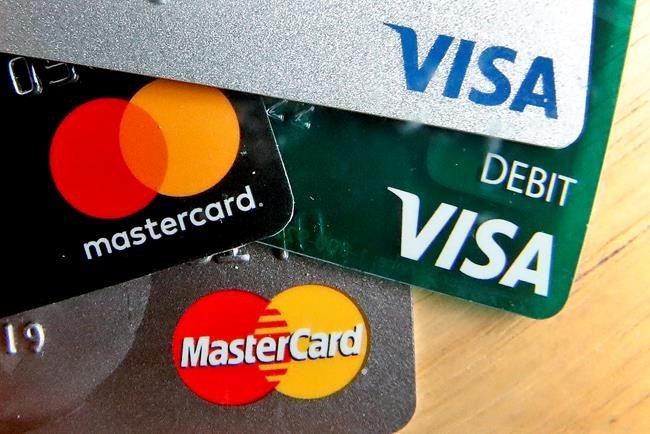
This Wednesday, Feb. 20, 2019, photo shows logos for credit cards in Zelienople, Pa. THE CANADIAN PRESS/AP, Keith Srakocic
August 16, 2022 - 10:00 AM
Chloe D’Agostini was at a co-working café while living abroad when someone walked in, sat down beside her, and discretely stole her wallet from her bag.
The 30-year-old from Toronto said she didn’t notice her wallet was missing until 20 minutes later when she was packing up her bag to meet a friend for lunch. Footage from the café's security camera later confirmed the theft.
Within a matter of 30 minutes, thousands of dollars were racked up on different credit cards.
D’Agostini then received a phone call from someone claiming to be from Apple stating they had noticed suspicious activity with her Apple ID and asked if she could download software so they could help. After a few minutes, D’Agostini thought the call was suspicious and hung up. Later she called Apple, who explained they don't call without a booked appointment.
While theft and fraud happen everywhere, the challenge of experiencing it while travelling is that you might spend more time on the phone than soaking up rays at the beach, and you can't pop round to your bank branch to sort it out in person. In other instances, you might get stuck dealing with an online travel scam before you even get to take off.
In TransUnion’s latest fraud report published in May, data shows that travel and industry saw a 59.9 per cent grow in digital fraud attempts for transactions coming from Canada and 13.3 per cent globally.
The increase in digital travel fraud can be attributed to the economy moving toward pre-pandemic levels, specifically in the travel industry.
“Canadians started to get more comfortable with the idea of travelling again and fraudsters caught on and directed their attention towards the activity spike in this sector,” said Ted Trush, director of Solutions Consulting at TransUnion Canada.
Examples of digital fraud in this sector include consumers who are travelling and have their credit cards stolen for the purpose of making fraudulent charges. Digital travel fraud also affects consumers directly on web or mobile, such as through encounters with fake travel agents or hotel websites.
“Essentially fraudsters move to where the money is. As an example, mobile app traffic has been increasing steadily over the last decade so fraudsters tend to focus their attention there. When chip-and-pin was introduced on credit cards, fraudsters moved to online transactions because it was less protected,” said Trush.
He advises Canadians who are travelling ensure they only provide banking information to legitimate businesses and websites.
Trush also recommends consumers read review sites for other customer comments or complaints, as well as research pricing for flights or accommodations and watch for anomalies such as extreme discounts.
“Consumers are also encouraged to be attentive when it comes to emails that seem out of place, as phishing attacks continue to be reported most often when it comes to fraudsters gaining private and personal information,” he said.
Caval Olson-Lepage, advisory team lead, wealth at Affinity Credit Union, said that whenever you receive an email or text message, you should be asking yourself: "Am I expecting this? And, is this coming from a legitimate source?"
“I’d be very wary of clicking on links in an email. I would rather search the legitimate website and search for that information and then click through it on a link,” she said.
Apple wouldn't comment on D'Agostini's specific case, but the company's website includes a warning about unexpected messages or requests for personal information: "It’s safer to presume it’s a scam and contact that company directly if you need to."
Olson-Lepage also cautions against using public Wi-Fi for financial transactions, which might happen more when someone’s travelling compared to when they’re at home or work. She recommends setting up a virtual private network (VPN) before travelling to hide your online activity. Another option is to purchase an international data plan from your provider so you can avoid using Wi-Fi.
If you think you’ve been a victim of fraud or your information has been compromised, Olson-Lepage said to contact your financial institutions immediately.
Trush added that TransUnion offers customers the ability to add a potential or confirmed fraud warning to their credit file.
“This warns creditors to take additional steps to verify your identify before deciding to extend credit and provides the creditor with a contact phone number,” he said.
While D’Agostini was able to have her credit cards expedited, a new RBC debit card had to be shipped through regular mail. It took three months for the card to arrive, and D’Agostini said there was no tracking.
“Stuff like this is stressful when you’re under pressure and you need to access money,” D’Agostini said.
She said getting the bank on the phone was also frustrating because of extensive hold times.
A spokesperson for RBC said that once a new card is requested, RBC processes the request and the card is send out via Canada Post. The processing time is typically completed by the following business day, but delivery ultimately depends on Canada Post.
D’Agostini was not held responsible for any of the fraudulent charges.
Her advice to others is to avoid carrying multiple credit cards in your wallet at a time so all your accounts aren’t locked up if your wallet goes missing.
This report by The Canadian Press was first published August 15, 2022.
News from © The Canadian Press, 2022